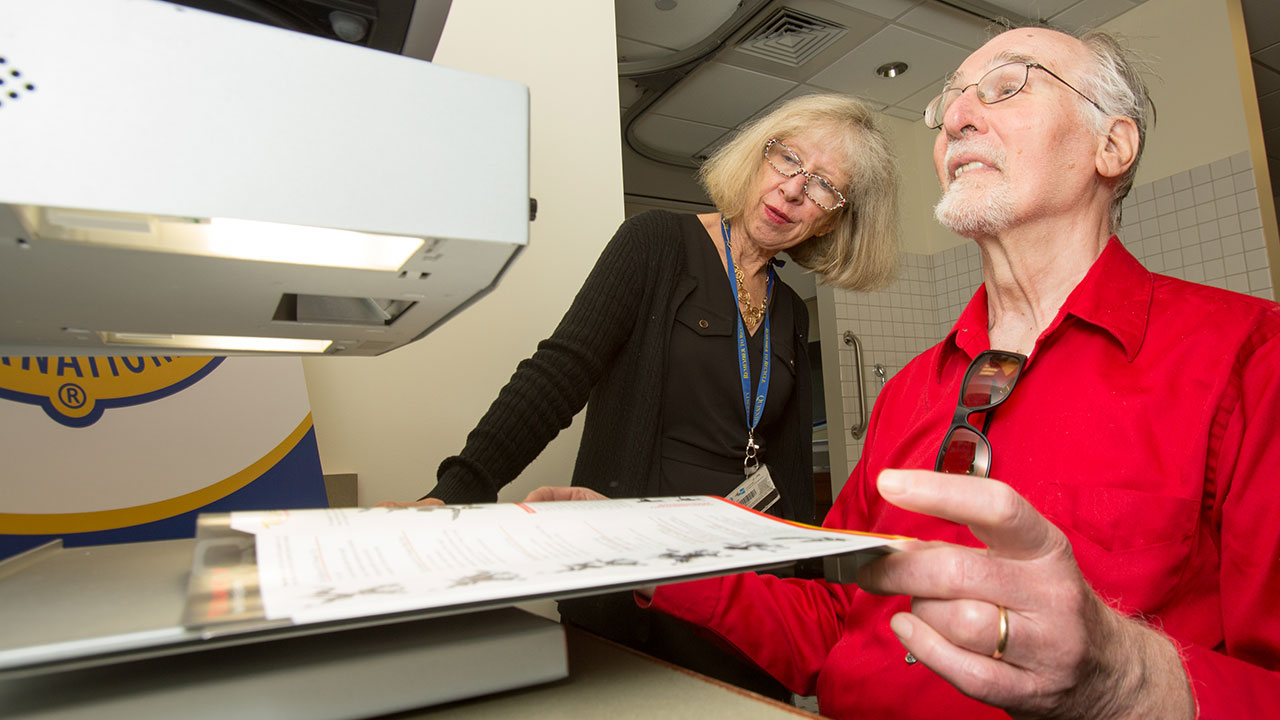Martha Sanders, left, associate professor of occupational therapy at Quinnipiac University, trains Henry Scopp, of West Haven, on the use a MagniSight Explorer video magnifier for reading. Quinnipiac and Lions International have teamed up to offer free services and equipment for patients with low vision.
Quinnipiac University and Lions International have teamed up to offer free services and equipment for patients with low vision.
The Lions Low Vision Center at Quinnipiac is open Thursdays from 1-4 p.m. on the North Haven Campus, 370 Bassett Road.
Patients at Quinnipiac are met by social work and occupational therapy professors. They are evaluated to see if rehabilitation and the use of adaptive devices – including hand-held and desktop magnifiers, large print clocks and books, special lighting and telephones with large keypads – can help them use their remaining vision and maintain quality of life.
“We analyze what adaptations are needed,” said Kimberly Hartmann, professor of occupational therapy and director of the Center for Interprofessional Healthcare Education. “In the future, we may go to the patient’s home, work or school if they are of school age. Low vision is one of the fastest-growing diagnoses in the United States simply because people live longer.”
The patient’s doctor must approve the adaptive equipment, which is funded by the Lions Club. The Quinnipiac professors then show the patients how to use the equipment.
West Haven’s Henry Scopp recently visited Quinnipiac to learn how to use a MagniSight Explorer video magnifier for reading. Martha Sanders, assistant professor of occupational therapy, showed Scopp the ins and outs of the machine, which he was allowed to take home.
“This is an excellent opportunity for me to get help,” Scopp said. “Reading has been my most difficult thing. I like to read. This is a wonder for me. It’s really going to make my life a lot better. Quinnipiac and the Lions have been tremendous.”
Catherine Meriano, professor of occupational therapy and director of the entry-level master’s degree in occupational therapy program, said the impact low vision has on the simplest tasks is tremendous.
“Providing adaptations that allow clients to play cards again, read the newspaper, or be able to write out their own checks makes a huge difference in their quality of life,” she added.
Hartmann said the goal is to expand the center to include students from a variety of academic programs such as medicine and gerontology.
“It’s designed to be an interprofessional clinic,” Hartmann said.
Low vision is the degree of vision loss that cannot be corrected by eyeglasses, contacts, medicine or surgery. Candidates for the centers must visit an eye-care professional within a month and obtain a prescription for a low-vision evaluation. The Lions review the prescription and filter patients to one of their seven centers in the state.
For more information, call 203-582-7703.
